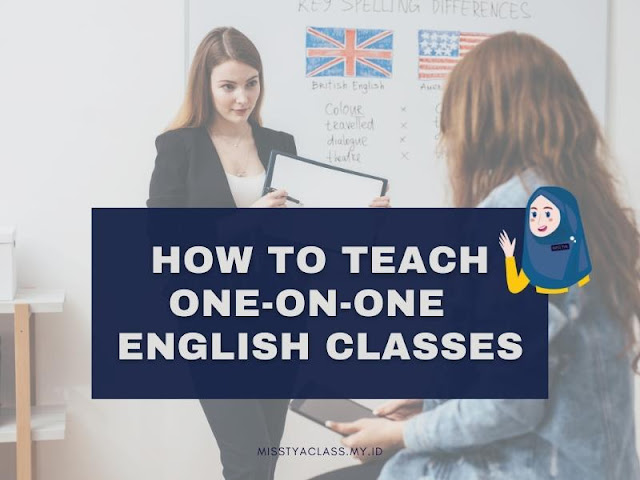Teaching individualized classes can be challenging yet frustrating, especially when your student is not as enthusiastic as you. Unlike a large classroom, where students are often pressured to perform well, a one-on-one class offers personalized instruction and allows students to speak freely. However, we need to factor in the student's personality in planning our lessons to run smoothly.
Reasons a student asks for a one-on-one class.
Since I started my teaching career, I have been teaching many one-on-one classes. Some of the classes indeed made me frustrated for many reasons. But as a teacher, it is essential to know why some students ask and/prefer a one-on-one class. Here are some reasons for taking a one-on-one class:
1. The student's level is lower/higher than others.
Sometimes a student joins an individualized class because there is no class available for his/her level, either it's too high or too low. In this case, a one-on-one class is a solution to cater to students' needs. The teacher can create a personalized lesson based on students' needs to help students develop their English skills.2. Student's personality
Being a talkative person, I (almost) never have any problems working with and meeting new people. Back in 2000, when I was a student in an English course, I was the loudest and most enthusiastic when studying. As a teacher, I am always grateful to have enthusiastic students because they make teaching more manageable and less stressful.However, some students are quiet in the class. It could be their nature, being a quiet person, or it's because they are shy. These students may feel uncomfortable studying in a big group. Instead of motivating them to participate actively, they could be unmotivated to study and constantly feel under pressure.
3. Parents' request
Some parents can be very demanding regarding their child's learning process. I have met many competitive parents who expect specific results from their children. As a mother, I don't really blame them because parents always want the best for and from their children. To achieve these specific goals, parents usually request a one-on-one class for their children.4. The student has to achieve a specific goal within a short time.
A one-on-one class is also requested by students who need to achieve a specific goal, for example, IELTS band score and TOEFL score. They take this type of class so that they can study intensively to prepare for their exams.Benefits of one-on-one classes
One-on-one classes provide the best opportunities for interpersonal communication. Unlike a large classroom, a one-on-one class will be more personalized and focused. Similarly, two-on-one students will be more motivated to learn. As a result, a one-on-one classroom can be a great place for teachers who want to reach out to students. With so many benefits, the one-on-one model is worth a try.A more personalized learning process
The advantages of teaching a one-on-one class over a large-group class are numerous. First, the individual nature of the learning process is more personalized, as opposed to a group-on-one classroom. Furthermore, students benefit from the one-on-one approach. They are more likely to interact with their teacher, which will enhance the quality of the lesson. When they feel comfortable with you, they are more likely to learn and retain information.Students are more motivated and engaged.
Another advantage of one-on-one classes is that the individual student can better understand the material and teacher. Secondly, the student will be more motivated to learn and be more engaged in the learning process. Moreover, he or she will be more likely to remember what is taught. The student will be able to ask questions and feel comfortable. If the teacher feels comfortable with the individual student, he or she is more likely to address the student's needs.Develop student's interpersonal skills
A one-on-one class can benefit students in a variety of ways. In addition to providing individual attention, one-on-one interactions also provide ample opportunities for students to develop their interpersonal skills. In addition, a one-on-one class allows students to process questions and answers. Thus, the student can gain more confidence in learning. You can even tailor the lessons to suit the needs of your student.Teachers can nurture the student more.
Compared to a group class, a one-on-one class is more beneficial for students. The teacher will be able to nurture the student more, and the student will be more likely to share his or her thoughts and ideas. The teacher will also be able to provide more personalized attention. If the student feels comfortable with the teacher, he or she is more likely to be open to sharing his or her ideas.Students take responsibility for their learning.
One-on-one interactions give students the chance to step up their game and take responsibility for their learning. They will be forced to take the course work seriously, significantly benefiting your students. The small group size also allows the student to ask questions and curate conversations. It will also give the student a better understanding of the teacher's style and will allow the student to be more creative with the teacher.How to encourage student participation in individualized classes
Now you know that there are many advantages of a one-on-one class. Here are some tips to encourage student participation in individualized classes:
Create an environment that promotes learning
Students can feel free to discuss problems and ask questions in a one-on-one class. This environment will encourage students to speak freely and take the initiative. Students are probably less shy to ask the teacher if something is still unclear. Teachers can also follow the student's pace in learning.Give meaningful feedback
In this type of class, students will receive more detailed feedback from their teacher. This is because students will feel more comfortable discussing their difficulties and successes in the class. In a group setting, teachers may feel uncomfortable discussing errors and other inadequacies that a student may make and unable to effectively respond to the criticism. Alternatively, a one-on-one class will allow students to share their concerns and learn from their mistakes.Personal attention
Having an individual teacher allows a teacher to know a student better than a larger group. This means that they can work with the student individually and offer support when needed. The one-on-one environment also allows the teacher to plan the next class and improve their teaching methods. This method will help students succeed and make the experience more enjoyable. So, why not consider a one-on-one class?Having a one-on-one class is more personal
The teacher has the student's full attention during the lesson, which will enable them to grasp the concepts and learn them more efficiently. A private classroom allows the student to ask questions and solve problems. It also helps ensure that each student understands the topics and that any queries are appropriately addressed. The one-on-one format allows the teacher to go into greater detail with the student and is beneficial for both the student and the teacher.
Final thought
All in all, a one-on-one class is not everybody’s cup of tea. This goes to both teachers and students. As a teacher, I am personally always challenged whenever I have to teach this kind of class. I have to admit that I spend more time preparing the lesson with this class.It may take time for teachers to be comfortable teaching a one-on-one class. However, I believe teachers need to prepare themselves to teach this class when it is required by the school, or there is a job offer. We’ll never know!
So, are you ready to teach one-on-one classes?










The article is very good and interesting.It can engage English learners to be more confident!
ReplyDeletethank you miss tya for this article. its motivated to another english teacher, keep writing.
ReplyDeleteI just think ... how lucky a student who is taught by Miss Tya in a one-on-one class because Miss Tya knows well how to manage the class and how to prepare and provide the teaching materials.
ReplyDeleteKayaknya kalo belajar satu lawan satu gini bakalan lebih masuk ya pelajarannya karena gurunya fokus ke satu siswa aja.
ReplyDeleteHallo mba Tya. Be a teacher isn't easy. So proud of you. Pendekatan one by one keypads murid juga diperlukan untuk juga tahu lebih banyak tentang mereka
ReplyDeleteI have been there, miss Tya.
ReplyDeleteMy parents especially my mother loves to One on One Conversation English Class than in a group.
So,
in a apecial situation, i feel like don't wanna take a lesson, because too boring.
But,
I think...it depends on the teacher.
If the teacher's know how to make a happy class, the One on One Conversation English Class more better or even it could be a great class.